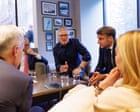There was one defining image from Keir Starmer’s intense diplomatic shift at the G7 summit in Canada: himbending atDonald Trump’s waist level to collect spilled pages of a UK-US trade deal. Defining, perhaps. But definitely partial.
Arguably more significant was a slightly more prosaic snap slipped out on the Downing Street Flickr feeda day before, showing Starmer engrossed in a chat with four other world leaders, Emmanuel Macron, Mark Carney, Giorgia Meloni and Friedrich Merz.
By No 10’s version, briefed to reporters after the Sunday evening gathering in a hotel at the summit venue in Kananaskis, Starmer and Merz, the German chancellor, happened on each other by chance and began chatting, before the French president and Italian and Canadian prime minister joined in.
This highly informal chat over a glass of wine with no officials present was presented as a general pre-summit discussion. But it would not take much imagination to guess that much of this preparation was based around a perennial subject of modern diplomacy: how to handle Trump.
Taken together, the two vignettes sum up Starmer’s balancing act which also takes in foreign and domestic political considerations.
For reasons that even Starmer cheerfully admits he doesn’t entirely understand, Trump clearly likes him and regularly says so. As such, Starmer’s unofficial role inCanadawas to be a sensible voice of liaison with Carney, the host, and others, while also trying to stop the US president wandering too far off-piste.
In terms of overt results, this was not a success. Sitting next to Trump at the leaders’ dinner, Starmer helped persuade him to sign up to the one jointG7statement that emerged, calling on Israel and Iran to pull back from all-out war.
But then, as is so often the case with Trump, came the humiliation. More or less as soon as Starmer had insisted to the media that Trump had no interest in the US joining in against Iran, the already-departed US presidentwas postingabout the need for “unconditional surrender” from Tehran, hinting heavily that without this, US armaments could begin to fall.
At the same time, and as much as anyone can claim positives while the world slides ever further into crisis, Starmer’s three days in Canada can still in part be viewed as a success, diplomatically and in terms of more domestic considerations.
His first destination was Ottawa for a pre-summit get-together with Carney, the still-new and surprising Canadian prime minister, whom Starmer knows well and talks about warmly in private.
The pair held a private dinner at Rideau Cottage, the temporary official residence for Canadian prime ministers with the usual home, 24 Sussex Drive, stricken by asbestos, mould and rodents, before going to a bar to watch Carney’s ice hockey team, the Edmonton Oilers, lose one of the Stanley Cup final games to the Florida Panthers.
The pair then held formal bilateral talks the next day, pledging progress on mutual trade, before heading off to the more remote G7 venue, held in the small resort town of Kananaskis, in Alberta’s stretch of the Rocky Mountains.
While the site was remote enough to stop even the faintest hint of protests – leaders were shuttled to and from Calgary airport in Chinook helicopters – it brought other worries,notably bears, with a huge local grizzly known as Boss spotted on the resort golf course the day before Starmer held broadcast interviews there.
Starmer is a keen and seemingly talented diplomat – his one G7 mishap was to shake the hand of a South Korean interpreter, mistaking him for the country’s new president – even if his simultaneous cosying up to Trump, Carney and other leaders could do nothing to make the summit check even one of the current international crises.
But he leaves with some achievements, including Trump’s signature on an executive ordersealing a US-UK trade deal, which saves British aerospace and car manufacturers from the worst of American tariffs. Some British voters might have qualms about Starmer making such an effort with a president they dislike, but No 10 can, and does, point to tangible benefits.
In his various interactions with the UK press over the course of the summit, including TV interviews and two “huddles”, informal and off-camera press conferences with the print media, one on the flight over, Starmer also made sure to create news.
Flying to Canada he unexpectedly replied to a question on grooming gangs byannouncing a national inquiryinto them – to the visible surprise of the GB News reporter who asked – and subsequently made punchy criticisms of Conservative politicians for their failure to act.
At the second huddle, another standard-seeming question, on small boats,brought the threatof withholding visas for countries that refuse to take back refused asylum seekers.
Amid all this juggling of the big egos and difficult personalities at the G7, as well as the never-ending sequence of domestic issues to hose down, lies a broader and longer-term goal.
It is a political truism that voters tend not to notice diplomatic news, unless something goes obviously wrong. And it was certainly the case that Rishi Sunak’s equally energetic summit efforts brought minimal attention, until heleft a D-day event earlyduring the election campaign.
But No 10 officials will be aware that when the next election comes, voters are likely to face a choice of Starmer, Nigel Farage or – perhaps – Kemi Badenoch. If the global scene is anywhere near as chaotic as now, there will be a big contrast between a leader who has shown he can adeptly pick his way around the summit circuit, and two diplomacy novices.
This might not be enough to change the course of an election. But it could concentrate some minds. And as Pierre Poilievre, theTrump-adjacent Conservativevanquished by Carneyin Canada’s electionin April knows only too well, as a politician you entirely write off international affairs at your peril.
